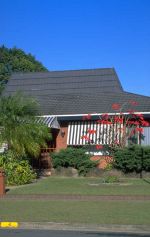
Don't get caught in the housing bubble crash (part one)
 Thursday, December 29, 2005 Thursday, December 29, 2005by Mike Adams, the Health Ranger Editor of NaturalNews.com (See all articles...) Tags: housing bubble, real estate bubble, interest rates |
- Aerosolized bioweapons? Strange “diploid biomasses” falling out of the sky in Florida captured under the microscope
- Possible biosignatures detected on Exoplanet K2-18b, raising hopes for alien life
- U.S. demands U.K. protect FREE SPEECH, repeal hate speech authoritarianism, in latest trade deal negotiations
- Russia escalates censorship war, targets over 200 VPN apps amid Google resistance
- Analysis: The coming economic collapse, a mass uprising and Trump's three secret weapons to halt the growing revolt
- HHS Secretary Kennedy will likely investigate the following environmental exposures as CAUSES OF AUTISM and brain damage in children
- TAKE IT DOWN Act advances in Congress amid free speech concerns
- Trump's bold trade overhaul reaches a crossroads with Italy, as "fair deals" promise sparks global attention
- Kiss Your Genetic Privacy Good-Bye! 23andMe Gets Green Light to Sell Your Intimate Genetic Details to Anyone They Want
- Israeli lobbyists boast of controlling US national security policy in leaked AIPAC audio
- Mike Adams releases country western hit single: Goin’ Back in Time is Comin’ Home
- Kava: The Pacific's healing wonder
- Scientists debate possibility of TIME TRAVEL, after Trump Admin says new technologies can "bend space and time"
- Maple syrup: Nature's golden superfood and its sweet health benefits
- Widespread social and economic unrest: Steve Quayle issues urgent financial warning of imminent asset collapse in new interview with Mike Adams
- M.W. Walbert’s “The Coming Battle” traces the evolution of money power in America
- Manufacturing surge under Trump sparks optimism amid concerns over economic strains
- Russia's migrant dilemma: Balancing security and human rights amid rising xenophobia
- Aerosolized bioweapons? Strange “diploid biomasses” falling out of the sky in Florida captured under the microscope
- Analysis: The coming economic collapse, a mass uprising and Trump's three secret weapons to halt the growing revolt
- Widespread social and economic unrest: Steve Quayle issues urgent financial warning of imminent asset collapse in new interview with Mike Adams
- TAKE IT DOWN Act advances in Congress amid free speech concerns
- Israeli lobbyists boast of controlling US national security policy in leaked AIPAC audio
- Kiss Your Genetic Privacy Good-Bye! 23andMe Gets Green Light to Sell Your Intimate Genetic Details to Anyone They Want
- Mike Adams releases country western hit single: Goin’ Back in Time is Comin’ Home
- U.S. lawmakers investigate Meta over alleged China collaboration
- CLOT SHOT PLANDEMIC UNFOLDING: Fibrous, rubbery clots caused by covid injections have prion-like seeding activity
- Fauci is back in the limelight, and he’s busy promoting a future COVID or FLU pandemic
- Defunding DEADLY mRNA jabs: Government funding for mRNA technology being scrutinized and sidelined until proven "safe and effective" for real
- Russia escalates censorship war, targets over 200 VPN apps amid Google resistance
- Curcumin’s ancient healing power supercharges muscle recovery, and its effects are compounded with anti-inflammatory foods and supplements
- I Want My Bailout Money – new song and music video released by Mike Adams
- I Want My Bailout Money – new song released by Mike Adams
- Government waste exposed: Hegseth supports Musk’s demand for accountability from federal workers
- U.S. approves new Russian ambassador as diplomatic thaw continues
- Federal employees whine over DOGE's new directive requiring them to do a 5-point summary of weekly accomplishments
- Newly released JFK files reveal Pentagon's role in creating Lyme disease and covid in the same lab
- Analysis: The coming economic collapse, a mass uprising and Trump's three secret weapons to halt the growing revolt
- Aerosolized bioweapons? Strange “diploid biomasses” falling out of the sky in Florida captured under the microscope
- Kiss Your Genetic Privacy Good-Bye! 23andMe Gets Green Light to Sell Your Intimate Genetic Details to Anyone They Want
- Mike Adams releases country western hit single: Goin’ Back in Time is Comin’ Home
- European Court of Justice: Healthcare professionals who promoted or administered COVID-19 vaccines are CRIMINALLY LIABLE for any harm caused
- Widespread social and economic unrest: Steve Quayle issues urgent financial warning of imminent asset collapse in new interview with Mike Adams
- Federal employees whine over DOGE's new directive requiring them to do a 5-point summary of weekly accomplishments
- U.S. approves new Russian ambassador as diplomatic thaw continues
- CLOT SHOT PLANDEMIC UNFOLDING: Fibrous, rubbery clots caused by covid injections have prion-like seeding activity
- Government waste exposed: Hegseth supports Musk’s demand for accountability from federal workers
- I Want My Bailout Money – new song and music video released by Mike Adams
- I Want My Bailout Money – new song released by Mike Adams
- Fauci is back in the limelight, and he’s busy promoting a future COVID or FLU pandemic
- Defunding DEADLY mRNA jabs: Government funding for mRNA technology being scrutinized and sidelined until proven "safe and effective" for real
- Trump administration poised to overhaul crypto regulations with new SEC leadership
- Now you can HEAR chemistry: Health Ranger translates molecules into music in stunning video demonstration that will blow your mind (and your ears)
- South Carolina Congressman proposes new $250 bill and wants Trump on the front
- Red Cross issues warning to stop blood plasma donations from vaccinated people
- Scientists confirm: GENIUS brain function can be spontaneously unleashed in humans without any apparent cause
- EPA advisor admits the agency is funneling billions to climate groups ahead of Trump’s return to White House
- HYSSOP: What research reveals about the health benefits of this ancient holy herb
- Two containers with completed ballots fall out of truck in Florida
- Newly released JFK files reveal Pentagon's role in creating Lyme disease and covid in the same lab
- Mike Adams releases country western hit single: Goin’ Back in Time is Comin’ Home
- Global leaders unite to clamp down on “misinformation” with UN-backed Cascais Declaration
- BREAKING: 2025 NDAA authorizes mandatory military draft of WOMEN across America… as Pentagon pursues global NUCLEAR war with both Russia and China at the same time
- I Want My Bailout Money – new song released by Mike Adams
- Michael Yon warns of a ZIONIST TAKEOVER in Trump’s second administration
- The Health Ranger releases “Vaccine Zombie” song and music video, using AI-animated zombies for the music video
- Ozempic and Wegovy weight loss drugs are injectable LIZARD VENOM PEPTIDES that may unleash a devastating wave of organ failure… side effects align with symptoms of SNAKE BITES
- BOMBSHELL: DNA testing kits are a SCAM to develop ethnic-specific bioweapons
- Israeli soldiers accused of even more torture and abuse in the West Bank
- These 13 countries just signed an agreement to engineer a global FAMINE by destroying food supply
- RFK Jr. clears key hurdle: Sen. Susan Collins backs controversial HHS nominee, signaling a new era for health policy
- NASA admits that climate change occurs because of changes in Earth’s solar orbit, and NOT because of SUVs and fossil fuels
In 1998, I began loudly warning people about the approaching dot-com bust. I had analyzed the situation and knew the bubble was going to burst. There was no doubt in my mind, because I looked at the fundamentals of these internet companies' finances... the internet startups that had stock prices in the billions of dollars but had sold no products, had no revenues and had no customers. You don't have to be a genius to figure out that bubble was going to burst, and something very similar is happening today in the housing market. I'll explain all this later.
The model of the dot-com bust
First, let's get back to the dot-com market, because, in hindsight, it was easy to see that it was a bubble about to burst. Think about what you were doing in 1998, 1999 or 2000. You were probably invested in the stock market. You thought you were doing pretty well. You thought you were building up a huge retirement. Everybody was getting rich, at least on paper.I remember one financial quack at the American Enterprise Institute (a conservative "think tank" group) who wrote a book called Dow 36,000, predicting the Dow was going to hit 36,000 and everyone would get rich. People said, "The rules are all going to be changed, because the old rules of profit and loss and needing customers don't apply anymore." They said, "It's the new economy with the internet!" The fact is, it wasn't the new economy. It was just a new version of an old scam -- the bubble market.
We saw the same scam many times throughout history. We saw it in the railroad boom in early American history. There was a stock market bubble with the railroad expansion. People said railroads were going to make everybody rich. They poured all their money into building the railroads, and some cities had three or four different railroad lines (all redundant, of course). Before long, the railroad bubble popped, and people were left penniless.
Of course, much the same thing happened with the dot-com bust of 2001. Billions of dollars disappeared overnight. Well, it really didn't disappear, because it never existed in the first place except on paper. I didn't lose a dime, but a lot of people I knew lost a whole lot of money because they didn't listen. They thought the rules had changed and everybody was going to get rich selling each other increasingly expensive pieces of paper. How's that for an economy? It's insane. You can't get rich by trading pieces of paper with your friends and writing larger and larger numbers on those pieces of paper. That was pretty much what was going on during the dot-com boom.
People didn't want to hear the truth
All this time, I said, "It's going to crash." I was about three years early on the warnings. Some people at the time said I was completely nuts. They said I was a doomsayer. I was a doom and gloom person because I predicted the stock market would return to normal. They said, "You know, you're ruining the whole thing, Mike. You're such a pessimist. Why don't you have some optimism in this country? Why don't you talk about everybody getting rich, instead of the stock market crashing?" I said, "Because I'm looking at the fundamentals here, and it seems very obvious to me that this cannot continue." It can't continue when you have hype about a company like Excite at Home -- remember that company? It had a market capitalization of well over $1 billion, but during the crash, the stock value dropped 99.8 percent. I looked at that company, and I said, "Do you know what? Their stock is so overpriced, we would have to expand their sales to every planet in the solar system. Every planet would have to have 10 billion people on it. Every one of those people would have to buy their services to justify their current stock evaluation."I put two and two together and concluded, "I don't think there are people on Mars who have bandwidth. I don't think Pluto is populated by people who need Internet services. In fact, I don't think everybody on Earth has Internet access. I don't even think most of the people on earth have computers. So, this doesn't make any sense. The stock is going to have to correct."
Sure enough, it did. At the time, all the financial cheerleaders were demanding, "Put all your money in the stock market! Mortgage your home and use that money to buy stocks! You'll be rich! None of us will ever have to work again! None of us will have jobs anymore; we'll all get rich off the stock market!" That was the thinking of the day. It's just another version of the old stock market scam. People get taken by the same scam generation after generation because most people can't do math, and a lot of people want to believe they can get rich with no effort.
Why it's time to bail out of the real estate market
The same thing is happening today in the real estate market, and there are some very clear signs that are telling me it's time to bail out. Let me explain...Let's go back to the dot-com market. When does it make sense to invest in a company? It makes sense when you get returns on the dividends. If you invest $100 in a company, and you get $10 back every year on dividends, then you basically have a 10-year return on $100. That's reasonable. But if you invest $100 and you get a dividend of 10 cents, and the only reason you invested the $100 is because you thought you could sell it for $200, then it's no longer an investment. It's speculation.
That's where you don't even care about the fundamentals of the company you're investing in. You don't even care what they sell. You may not even know what they sell. You don't know anything about their products, markets, inventory, human resources or ethics. You're just there to speculate. You're there to double your money. Sell high, and buy low. That's what people were doing in the stock market, and the same thing is happening in housing now.
Why do people buy houses under normal economic conditions? They buy houses to live in them. You buy a house because you need a place to live, or because you really enjoy being a landlord, which is a thankless job, by the way (those of you who are landlords know that). You might buy houses as an investment vehicle, hoping the monthly rent will cover the cost of the house while you are building long-term equity in the house. In other words, the renter is paying your mortgage and allowing you to build long-term equity. So, you figure on gaining something over the long haul, like 20 or 30 years. These are normal, sane, housing investment ideas. You either buy a house to live in it, or you buy a house to rent it out to people.
In a sane, normal housing economy, that's the thinking that's going on. But today in the United States, especially in key cities, there's something amiss. Increasingly, people are not buying houses to live in them, nor to rent them out. They are buying them for speculation. They're buying them because they are anticipating a price increase. They're buying houses for the same reason they bought stocks during the internet boom. They don't even care what it's for. They don't care if the house is a place to live in. It's just a way to double their money.
What are the signs that this bubble is about to burst, and more importantly, what's going to happen after the bubble bursts? I'll save all of that for you in part two of this discussion. I'll give you the signs, what's likely to happen and what you can do to protect yourself from the inevitable financial fallout. I'll also tell you about home loan recalls. You may not know about this: the bank can send you a letter and recall your home loan and require you to pay tens of thousands, or even hundreds of thousands of dollars, because the housing market is rapidly plummeting. I'll cover all that in part two.
Housing bubble at FETCH.news
Get independent news alerts on natural cures, food lab tests, cannabis medicine, science, robotics, drones, privacy and more.
More news on housing bubble
 About the author:Mike Adams (aka the "Health Ranger") is a best selling author (#1 best selling science book on Amazon.com) and a globally recognized scientific researcher in clean foods. He serves as the founding editor of NaturalNews.com and the lab science director of an internationally accredited (ISO 17025) analytical laboratory known as CWC Labs. There, he was awarded a Certificate of Excellence for achieving extremely high accuracy in the analysis of toxic elements in unknown water samples using ICP-MS instrumentation. Adams is also highly proficient in running liquid chromatography, ion chromatography and mass spectrometry time-of-flight analytical instrumentation.
About the author:Mike Adams (aka the "Health Ranger") is a best selling author (#1 best selling science book on Amazon.com) and a globally recognized scientific researcher in clean foods. He serves as the founding editor of NaturalNews.com and the lab science director of an internationally accredited (ISO 17025) analytical laboratory known as CWC Labs. There, he was awarded a Certificate of Excellence for achieving extremely high accuracy in the analysis of toxic elements in unknown water samples using ICP-MS instrumentation. Adams is also highly proficient in running liquid chromatography, ion chromatography and mass spectrometry time-of-flight analytical instrumentation.
Adams is a person of color whose ancestors include Africans and Native American Indians. He's also of Native American heritage, which he credits as inspiring his "Health Ranger" passion for protecting life and nature against the destruction caused by chemicals, heavy metals and other forms of pollution.
Adams is the founder and publisher of the open source science journal Natural Science Journal, the author of numerous peer-reviewed science papers published by the journal, and the author of the world's first book that published ICP-MS heavy metals analysis results for foods, dietary supplements, pet food, spices and fast food. The book is entitled Food Forensics and is published by BenBella Books.
In his laboratory research, Adams has made numerous food safety breakthroughs such as revealing rice protein products imported from Asia to be contaminated with toxic heavy metals like lead, cadmium and tungsten. Adams was the first food science researcher to document high levels of tungsten in superfoods. He also discovered over 11 ppm lead in imported mangosteen powder, and led an industry-wide voluntary agreement to limit heavy metals in rice protein products.
In addition to his lab work, Adams is also the (non-paid) executive director of the non-profit Consumer Wellness Center (CWC), an organization that redirects 100% of its donations receipts to grant programs that teach children and women how to grow their own food or vastly improve their nutrition. Through the non-profit CWC, Adams also launched Nutrition Rescue, a program that donates essential vitamins to people in need. Click here to see some of the CWC success stories.
With a background in science and software technology, Adams is the original founder of the email newsletter technology company known as Arial Software. Using his technical experience combined with his love for natural health, Adams developed and deployed the content management system currently driving NaturalNews.com. He also engineered the high-level statistical algorithms that power SCIENCE.naturalnews.com, a massive research resource featuring over 10 million scientific studies.
Adams is well known for his incredibly popular consumer activism video blowing the lid on fake blueberries used throughout the food supply. He has also exposed "strange fibers" found in Chicken McNuggets, fake academic credentials of so-called health "gurus," dangerous "detox" products imported as battery acid and sold for oral consumption, fake acai berry scams, the California raw milk raids, the vaccine research fraud revealed by industry whistleblowers and many other topics.
Adams has also helped defend the rights of home gardeners and protect the medical freedom rights of parents. Adams is widely recognized to have made a remarkable global impact on issues like GMOs, vaccines, nutrition therapies, human consciousness.
In addition to his activism, Adams is an accomplished musician who has released over a dozen popular songs covering a variety of activism topics.
Click here to read a more detailed bio on Mike Adams, the Health Ranger, at HealthRanger.com.
Take Action: Support Natural News by linking to this article from your website
Permalink to this article:
Embed article link: (copy HTML code below):
Reprinting this article:
Non-commercial use OK, cite NaturalNews.com with clickable link.
Follow Natural News on Facebook, Twitter, Google Plus, and Pinterest
Science News & Studies
Medicine News and Information
Food News & Studies
Health News & Studies
Herbs News & Information
Pollution News & Studies
Cancer News & Studies
Climate News & Studies
Survival News & Information
Gear News & Information
News covering technology, stocks, hackers, and more



"Big Tech and mainstream media are constantly trying to silence the independent voices that dare to bring you the truth about toxic food ingredients, dangerous medications and the failed, fraudulent science of the profit-driven medical establishment.
Email is one of the best ways to make sure you stay informed, without the censorship of the tech giants (Google, Apple, Facebook, Twitter, YouTube, etc.). Stay informed and you'll even likely learn information that may help save your own life."
–The Health Ranger, Mike Adams













































